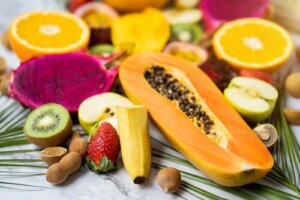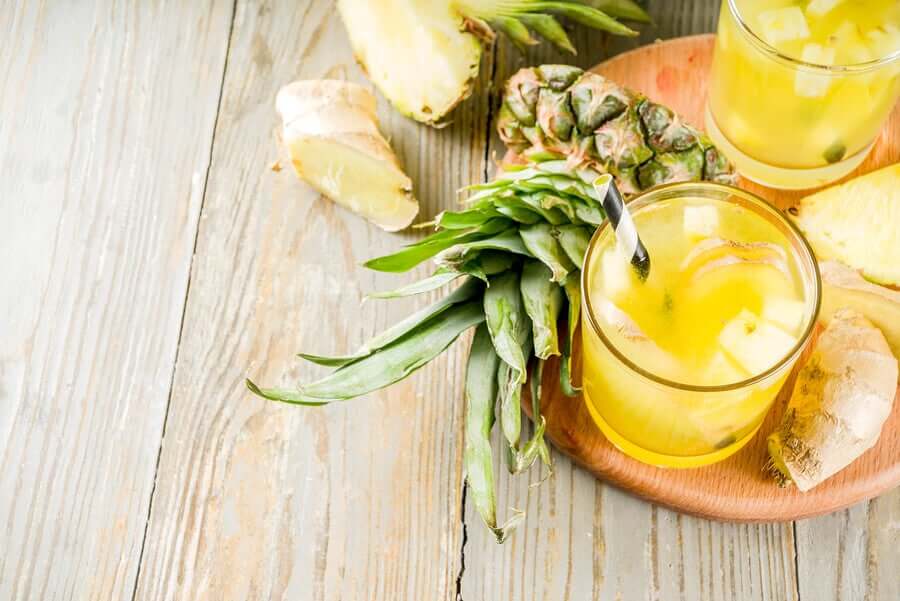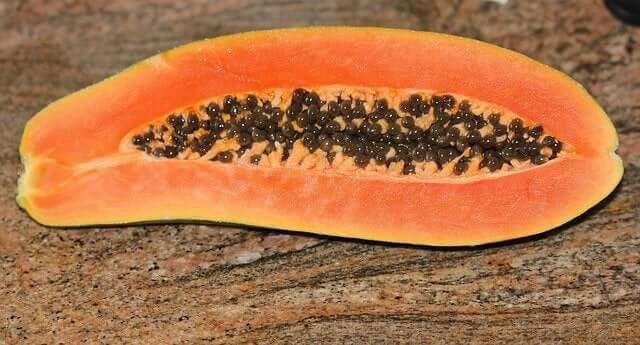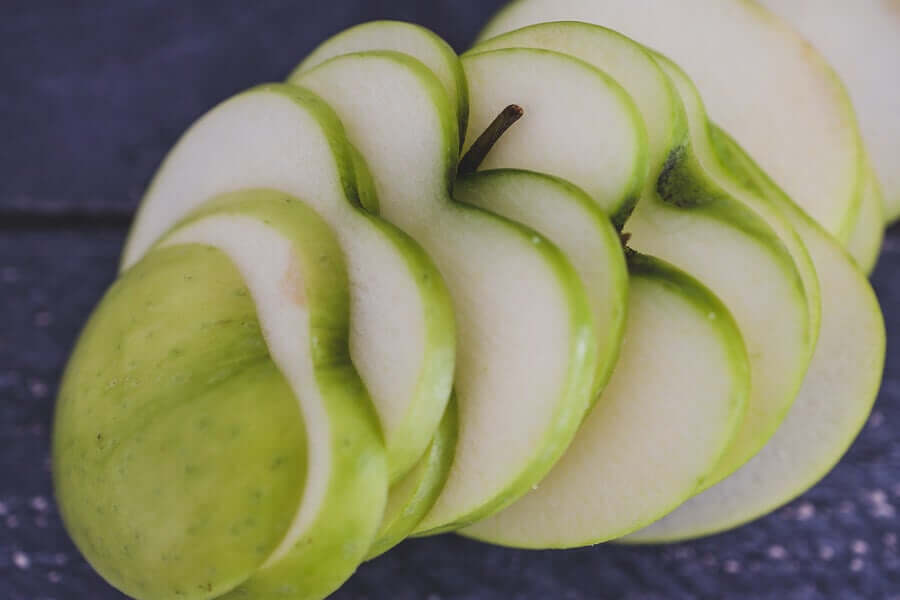The 5 Best Anti-Inflammatory Fruits


Written and verified by the pedagogue in physical education and nutritionist Elisa Morales Lupayante
There are several anti-inflammatory fruits or, rather, fruits that have a high water and fiber content (such as pectin, for example) and therefore help to hydrate the body, regulate bowel function, and expel retained fluids and waste.
In addition, these fruits contain antioxidants and various nutrients that benefit the health of the whole organism in general.
1. Pineapple, one of the best anti-inflammatory fruits

Pineapple is one of the best anti-inflammatory fruits that we can consume in our diet. Its secret lies in bromelain, an enzyme that contributes to the assimilation of amino acids and also helps the digestion process. Thanks to this, it helps to avoid inflammation.
Pineapple can be consumed in different ways, from salads to smoothies. Everything will depend on our tastes and needs.
Learn more: 3 Salads with Pineapple That Are Perfect for Dinner
2. Lemon and its bioflavonoids
Lemon is a food that, in addition to fiber, contains antioxidant substances that contribute to the health of the whole organism and, in a certain way, support anti-inflammation.
Another reason why lemon is considered one of the best anti-inflammatory fruits is because it contains vitamin C, a substance that protects the body’s cells from damage caused by free radicals and improves the functioning of the immune system.
In addition, this nutrient has been shown to intervene in the increase of collagen synthesis, which generates greater elasticity in lean tissues. This will help to ensure the proper functioning of muscles, which will be in good health.
3. Papaya, an ally to digestion

Papaya is a delicious fruit. Its pulp is soft, sweet and easy to digest. According to experts from the Spanish Nutrition Foundation (FEN), in addition to containing calcium, it contains enzymes that promote digestion, such as papain.
Papain is “a proteolytic enzyme, similar to pepsin, found in our gastric juice, with the capacity to digest food proteins, and which is responsible for softening the hard pulp of papaya”. This is evidenced by research published in the American Journal of Biochemistry and Biotechnology.
Therefore, it is said that papaya is an excellent ally to improve digestion, support intestinal transit and the expulsion of liquids and, in addition, to deflate the abdomen, which also supports weight loss.
4. Cherries, ideal for arthritis
According to FEN experts, cherries can provide a certain amount of potassium, provitamin A, vitamin C, magnesium, iron and phosphorus, which contribute to the overall diet. They also contain flavonoids, peryl alcohol, and organic acids.
In addition, cherries contain anthocyanins, substances that have demonstrated anti-inflammatory and antioxidant properties and contribute to the health of the entire body.
Try to combine these foods with other red fruits or berries. All of them have a high antioxidant capacity, which prevents the formation of free radicals. Always keep in mind that the accumulation of reactive species in tissues increases the risk of DNA mutations and inefficiencies in organ function.
5. The power of apples

Apples are fruits that provide the diet with a good amount of dietary fiber, as well as various flavonoids, such as quercetin. On the other hand, FEN experts comment that “it provides carbohydrates. These are mainly in the form of sugars such as fructose, glucose, and sucrose”. They also contain organic acids.
For all this, it’s said to be one of the best anti-inflammatory fruits that exist. Ideally, you should consume it regularly, in its natural state, as part of a balanced diet.
In addition to apples, it’s also advisable to introduce pears into your diet. Both foods have the same type of soluble fiber, pectin. This substance is able to stimulate the growth of bacteria that live in the intestine, generating benefits for the host. Complementing this contribution with a probiotic supplement can be a great option.
Read also: Delicious Green Apple and Celery Salad
Some considerations
In order to lose weight or simply achieve a flatter abdomen, we shouldn’t rely solely on the consumption of anti-inflammatory fruits and foods. Although these are recommended options, they can’t provide the desired effect by themselves. A healthy diet and exercise are the perfect combination.
On the other hand, we should always try to include several portions of natural fruit per day. In this way, we’ll avoid the consumption of snacks and industrial foodstuffs. And we’ll be able to achieve a complete, healthy, and balanced diet.
Fruits are excellent options for snacks and desserts. But they are also good options for snacks between meals. It’s important to keep in mind that it’s preferable to consume fruits in their natural state rather than in juices. This is because their nutritional contribution changes when they’re processed.
All cited sources were thoroughly reviewed by our team to ensure their quality, reliability, currency, and validity. The bibliography of this article was considered reliable and of academic or scientific accuracy.
- Amri E., Mamboya F., Papain, a plant enzyme of biological importance: a review. American Journal of Biochemistry and Biotechnology, 2012. 8 (2): 99-104.
- Jung M, Trievel S, et al. Influence of apple polyphenols on inflammatory gene expression. Molecular Nutrition & Food Research. Octubre 2009. 53 (10): 1263-80.
- Lee YM., Yoon Y., Yoon H., Park HM., et al., Dietary anthocyanins against obesity and inflammation. Nutrients, 2017.
- Liu RH. Health benefits of fruit and vegetables are from additive and synergistic combinations of phytochemicals. In: American Journal of Clinical Nutrition. 2003.
- Manganaris GA, Goulas V, Vicente AR, Terry LA. Berry antioxidants: Small fruits providing large benefits. Journal of the Science of Food and Agriculture. 2014.
- Maurer H. R. Bromelain: biochemistry, pharmacology and medical use. Journal of Plant Disease and Protection. Agosto 2001. 58. 1234-1245.
- Shaw G., Lee Berthel A., Roos ML., Wang B., Baar K., Vitamin C enriched gelatin supplementation before intermittent augments collagen synthesis. American Journal of Clinical Nutrition. 2017. 105 (1): 136-143.
This text is provided for informational purposes only and does not replace consultation with a professional. If in doubt, consult your specialist.








